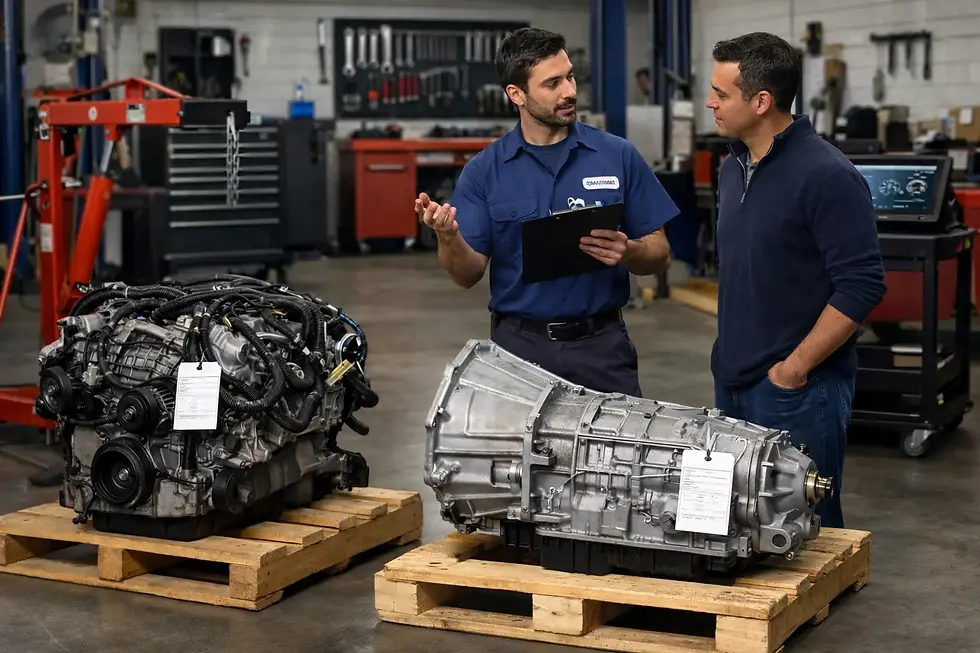Why Do Engines Blow Up? Blown Engine Causes and What Causes a Blown Piston
- blueprismautomotiv
- Aug 26, 2024
- 3 min read
Updated: Apr 18, 2025
Engines are complex machines designed to operate under high pressure and temperature. When something goes wrong, it can lead to catastrophic failure, often referred to as the engine "blowing up." This term describes a severe malfunction where parts break, causing significant damage. Understanding why engines blow up, the causes behind a blown engine, and specifically what leads to a blown piston can help in preventing these costly and dangerous issues.
Do Engines Blow Up?
Engines can blow up for several reasons, most of which involve internal stress that the engine components cannot handle. The most common cause is a failure in one of the engine’s core systems, such as cooling, lubrication, or fuel delivery. Here are some of the primary reasons engines blow up:
1. Overheating: When an engine overheats, it can cause metal components to expand and seize up. Overheating often occurs due to a failed radiator, low coolant levels, or a malfunctioning thermostat. Without proper cooling, the engine becomes too hot,

leading to warping or cracking of essential parts like the head gasket, cylinder head, or block. Once these parts are compromised, the engine is at high risk of blowing up.
2. Oil Starvation: Oil is the lifeblood of an engine. It lubricates moving parts, reducing friction and preventing excessive wear. If the engine is low on oil or if the oil pump fails, critical components like the crankshaft, camshaft, or bearings can overheat and break. This can cause the engine to seize, leading to a sudden and catastrophic failure.
3. Detonation or Pre-ignition: This occurs when fuel ignites prematurely in the cylinder, creating a sharp spike in pressure. Detonation is often caused by using low-octane fuel, excessive boost in turbocharged engines, or incorrect ignition timing. The extreme pressure can break pistons, crack cylinder walls, and even blow out head gaskets, leading to an engine blow-up.
Blown Engine Causes
A blown engine typically refers to an engine that has suffered severe internal damage, often beyond repair. Besides overheating, oil starvation, and detonation, other causes include:
Timing Belt Failure: The timing belt keeps the engine’s valves and pistons in sync. If it breaks or slips, the valves can collide with the pistons, causing catastrophic damage.
Fuel System Issues: Problems like a lean fuel mixture (too much air, not enough fuel) can cause the engine to run hotter than normal, leading to detonation and ultimately a blown engine.
Over-revving: Excessively high engine RPMs can cause parts like rods or pistons to break, especially in engines not designed for high performance.
What Causes a Blown Piston?
A blown piston is one of the most damaging engine failures. Pistons are subject to immense pressure and heat, making them vulnerable to damage under certain conditions. Common causes of a blown piston include:

1. Detonation: As mentioned earlier, detonation creates excessive pressure that can crack or shatter a piston.
2. Overheating: Excessive heat can cause pistons to expand and seize in the cylinder bore, leading to cracks or holes in the piston.
3. Poor Maintenance: Neglecting oil changes, using the wrong type of oil, or ignoring warning signs like knocking sounds can lead to piston failure.
Engine blow-ups are often the result of preventable issues like overheating, oil starvation, and detonation. Regular maintenance, proper oil levels, using the right fuel, and keeping an eye on engine temperature can go a long way in preventing a catastrophic engine failure. Understanding the causes of a blown engine and what specifically leads to a blown piston can help you take the necessary steps to keep your engine running smoothly and avoid costly repairs.




Comments